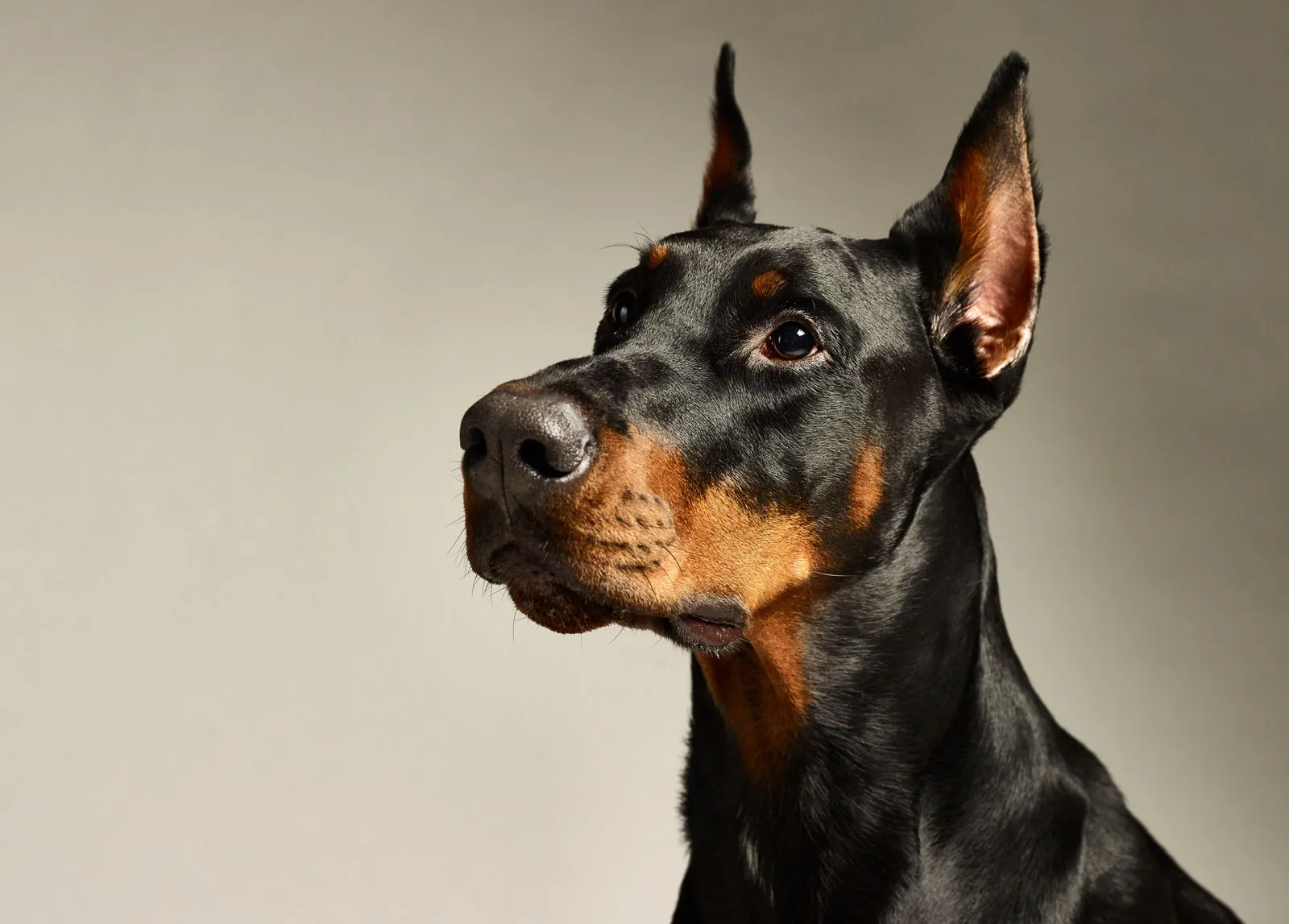The Grace and Strength of Dobermans: Unveiling the Elegance and Power of a Loyal Companion
An exploration of the grace and strength of Dobermans, including their origins, physical attributes, loyalty, intelligence, training and care, misconceptions, and common health considerations.
Overview of Dobermans
Dobermans have a rich history that dates back to the late 19th century in Germany when they were originally bred as guard dogs for tax collectors and loyal protectors of their owners. Their role evolved over time, and despite their initial reputation as fierce protectors, Dobermans are recognized for their affectionate and devoted nature, forming strong bonds with their families. One remarkable aspect of the breed is their name, which honors Louis Dobermann, the German tax collector who played a pivotal role in the development and breeding of these remarkable dogs.
In addition to their historical significance, Dobermans are known for their distinctive physical attributes and temperament. Their sleek and muscular build, coupled with their graceful movements, reflects a unique combination of elegance and strength that sets them apart from other breeds. The breed standard emphasizes the importance of a well-proportioned physique, highlighting their grace and power in various activities such as agility training and obedience competitions. This blend of grace and strength not only makes them visually striking but also showcases their versatility and athleticism in various dog sports and activities, further solidifying their reputation as exceptional companions and working dogs.
 The Grace and Strength of Dobermans
The Grace and Strength of Dobermans
The grace and strength exhibited by Dobermans are not only physical attributes but also intrinsic qualities that set them apart from other breeds. Beyond their striking appearance, Dobermans are known for their unwavering loyalty, which is a key component of their grace. Their loyalty is not limited to their immediate family but extends to being devoted protectors and companions. For instance, a Doberman’s loyalty can be seen in their natural instinct to stay close to their loved ones, always eager to offer protection and affection.
Moreover, the strength of Dobermans goes beyond their muscular build. It is evident in their resilience and determination, making them formidable working dogs and beloved family pets alike. Their strength is not just physical but also emotional, as they have the capacity to provide support and companionship in times of need. For example, the strength of a Doberman can be seen in their ability to sense when their owners are upset or anxious, offering comfort and reassurance. This unique blend of grace and strength makes Dobermans truly exceptional companions for those who appreciate both elegance and robustness in a canine companion.
Loyalty, Vigilance, and Intelligence
Dobermans’ loyalty is not only evident in their devotion to their immediate family but also extends to being protectors and companions to those they care for, showcasing their unwavering commitment. For instance, a Doberman named Khan in California became an internet sensation for saving his owner’s life by alerting her about a fire in the house, demonstrating the breed’s remarkable loyalty and vigilance. This exemplifies how Dobermans go above and beyond to ensure the safety and well-being of their loved ones.
Furthermore, the vigilance of Dobermans, when properly harnessed through training, becomes a crucial asset. These dogs are naturally alert and aware of their surroundings, making them excellent watchdogs. Through consistent training, their vigilance can be honed to distinguish between normal occurrences and potential dangers, making them reliable protectors. This combination of loyalty and vigilance makes Dobermans not only loving family pets but also vigilant guardians of their home and loved ones. Lastly, their high intelligence contributes significantly to their adaptability and problem-solving skills. For example, Dobermans excel in various canine sports and tasks that require quick thinking and learning, showcasing their exceptional cognitive abilities and making them a joy to train and engage with.
Training and Care for Dobermans
When it comes to training Dobermans, positive reinforcement techniques are not only effective but also essential for their development. By rewarding desirable behaviors with treats, praise, or toys, Dobermans are more likely to repeat those behaviors, making training sessions enjoyable and productive for both the dog and the owner. For instance, when teaching a Doberman to sit, using treats to reward the desired behavior can quickly reinforce the command and strengthen the bond between the dog and its owner.
In addition to mental stimulation through training, physical exercise is a key component of caring for a Doberman. These dogs are known for their athleticism and require regular exercise to keep them healthy and happy. Activities such as long walks, jogging, or playing fetch in a fenced yard not only help them release excess energy but also contribute to their overall well-being. Without proper exercise, Dobermans may become restless and engage in destructive behaviors out of boredom, highlighting the importance of incorporating physical activity into their daily routine.
Furthermore, grooming is a crucial aspect of Doberman care that should not be overlooked. Regular brushing not only helps to distribute natural oils throughout their coat, keeping it healthy and shiny, but it also provides an opportunity to check for any skin issues or abnormalities. Nail trimming is another essential grooming task, as overgrown nails can be uncomfortable for the dog and may lead to issues with walking or posture. By establishing a consistent grooming routine, owners can ensure that their Doberman not only looks great but also stays comfortable and healthy.
 Common Misconceptions about Dobermans
Common Misconceptions about Dobermans
One prevalent misconception surrounding Dobermans is the belief that they are inherently vicious due to their muscular build and alert demeanor. In reality, the temperament of a Doberman is shaped by various factors such as genetics, early socialization, and training. For example, a well-socialized and trained Doberman can exhibit calm and friendly behavior towards both familiar faces and strangers, showcasing their adaptability and gentle nature.
Another misconception that often arises is the assumption that all Dobermans have cropped ears and docked tails. While these practices have been common in the past for certain purposes, they are not mandatory or universal for the breed. Many Dobermans today have natural ears and tails, reflecting a shift towards more ethical and humane treatment of animals. This diversity in appearance among Dobermans highlights the individuality and uniqueness of each dog, regardless of whether they have cropped ears or docked tails.
It is essential to debunk these misconceptions and recognize that Dobermans can make loving and loyal companions when given proper care and attention. By understanding the breed’s true nature and characteristics, individuals can appreciate the grace, strength, and affection that Dobermans bring into their families. Through positive reinforcement, socialization, and responsible ownership, Dobermans can thrive as valued members of households, dispelling any lingering myths about their temperament and behavior.
Health Considerations for Doberman Pinschers
In addition to the grace and strength they exhibit, Doberman Pinschers are unfortunately prone to certain health issues that owners must be aware of. One such health concern is Von Willebrand’s disease, a genetic disorder that affects the blood’s ability to clot properly. To illustrate, if a Doberman Pinscher with Von Willebrand’s disease gets injured, they may experience prolonged bleeding, which can be life-threatening without prompt medical intervention. Therefore, owners of this breed must work closely with their veterinarians to monitor and manage this condition effectively, ensuring their furry companions lead healthy lives.
Another prevalent health issue among Doberman Pinschers is Dilated Cardiomyopathy, a condition that affects the heart muscle, leading to enlargement and decreased function of the heart chambers. For instance, this cardiac condition can result in symptoms such as weakness, coughing, and fainting, impacting the dog’s overall well-being and longevity. Given the severity of Dilated Cardiomyopathy, regular veterinary check-ups and cardiac screenings are vital for early detection and intervention, allowing for appropriate treatment and care to be administered promptly. By staying proactive in monitoring their Doberman Pinscher’s health, owners can help mitigate the risks associated with these prevalent health issues and provide their beloved pets with the best possible quality of life.



 The Grace and Strength of Dobermans
The Grace and Strength of Dobermans Common Misconceptions about Dobermans
Common Misconceptions about Dobermans